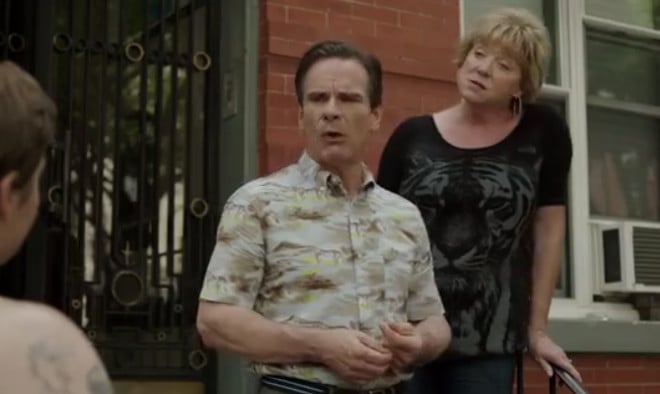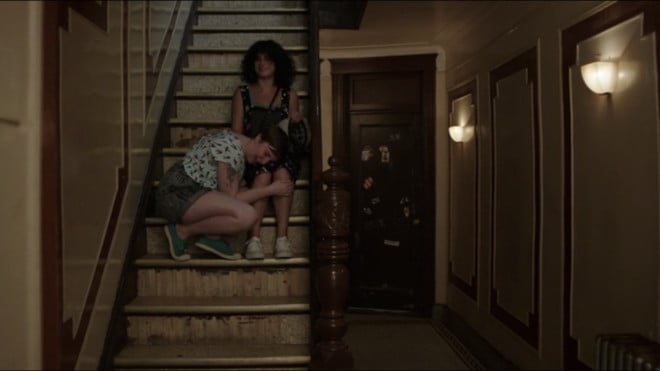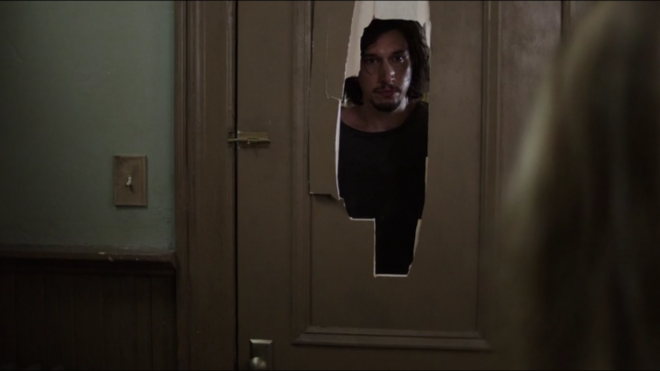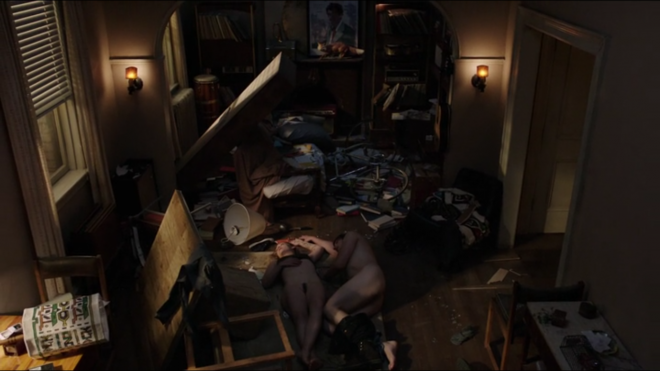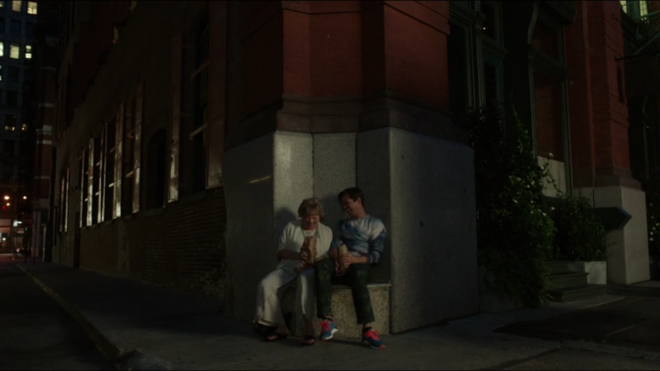Finale Recap: What (And Who) Changed This Season To Make ‘Girls’ So Good?
This show is a good, close, real friend. It may disappoint us, but it's proved itself deserving of our love.

This is a recap of the final episodes of Girls fifth season. Spoilers!
–
The first scene of Girls is Hannah having dinner with her parents, self-importantly explaining that she’s “busy trying to become who I am” as they tell her they’re cutting her off financially. It might be a little on the nose, or at least a bit reductive, to keep pointing to this scene as the thesis for the series, but I’m going to keep doing it because the show almost never loses sight of that idea. Your identity, your relationships, your personal narratives are driven by the twin engines of past and present; of constantly sorting through the bits of who you’ve been and deciding what to keep and what to leave in your wake.
The Hannah we see in the season five closer — a double episode, possibly more for Beyonce-scheduling reasons than creative ones — has recovered some equilibrium after a shaky couple of weeks. As she admits to her parents, Principal Toby and Tally, she was acting out largely because of the stress in her personal life: she was getting over a man she loved by spending her time with a man she knew she didn’t, and dealing with the destabilisation of her immediate family. (Keep in mind that she’s an only child; her immediate family is two people seeing their current identities and their discarded past selves in an entirely new light.)
Hannah’s a lot easier to take in these episodes than she was in the last two, and it’s because we’re seeing her unbottle this stress and anger and exhaustion. It’s a process that starts with getting Fran out of her apartment, picks up steam as she quits her teaching job and reconnects with her career-archnemesis Tally and — as she relays in her Moth story — peaks with her overhearing Adam and Jessa fighting as she delivers them a fruit basket. It’s such a relief to hear Hannah openly discuss how she’s actually feeling. Her relationship was bad. Fran does not like her and they are not suited to be a couple. She misses having Adam and Jessa in her life and does not think they will be good for one another. Her parents’ situation is making her feel so weirded out and shitty that she is voluntarily exercising for the endorphins. She does not want to write at all any more. She feels she has achieved nothing.
When she wraps this up in that stunning single take with no notecards — which manages to feel both like a well-told Moth story and a speech from the climax of a romcom — it’s a huge moment, professionally and emotionally. That clarity about her own feelings will help her as much as a writer as it will as a person; you need it to write, you need it to communicate your story well, and you need it to keep growing past your old selves into new ones.
When Hannah and Tally get high as shit they dance to ‘Feeling Myself’, which is a song where two women at the top of their game talk about being at the top of their game and never pretending to be otherwise. Feeling yourself is a good thing; it means loving yourself, but there’s an extra connotation of being in touch with your reasons for loving yourself, for having earned that love. You can’t fake your way to feeling yourself; you have to be in touch with your thoughts, your responses, your achievements and overall, your capacity for love.
In this pair of episodes, we see every character picking bits from their old selves and building new identities around them — and around the spaces where discarded parts used to be. Adam and Jessa’s fight, which teeters between being kind of funny and genuinely disturbing (and is so shocking in its violence I completely forgot that they had been looking after a baby just moments before), is about how their past will affect their future. Adam gets violent like he did with MRH (remember how he swept everything off a table when she told him about her abortion), but Jessa matches it so there’s never a real power imbalance. The Shining references in the bathroom (not just Adam coming through the door but also Jessa cowering against the wall next to it) keep the scene on the right side of ridiculous, but only just.
This all recalls the fact that Jessa predicted their relationship would end with Adam in a body bag and her fleeing to Mexico — these are characters who know themselves very well, but they don’t know how to extricate Hannah from their relationship, and they’re not on the same page about whether that’s even the best thing to do. It’s over the top, even for these two who are established gonzo-weirdo drama queens, but that beautiful, still final shot and pan up (Jenni Konner’s direction shouting out Scorsese as well as Kubrick) brings it back to an achingly human level. Echoing Fran’s breakup speech, it makes it simultaneously clear that they love each other and unclear if they like each other.
Fran’s yelling about how chill he is in the opening scene of episode nine, also echoed Marnie’s repeated insistence that she is a chill person, that she can totally be ~loosey-goosey~. Worth noting: in this episode, she indirectly acknowledges to Ray that she’s kinda high-maintenance and doesn’t apologise for it. It’s both maddening and satisfying to see her begrudgingly give in to her feelings for him here. Ray has been one of the best characters on this show since basically forever (and Alex Karpovsky’s direction on this, the second-best episode of the season, is beautiful) and I am on board with this relationship as long as he can retain his self-respect and Marnie continues to inch towards something resembling self-awareness.
Elijah, pushing for something new, works a v-neck/blazer combo like nobody else and tries to look the part as Dill’s Someone Special. This inadvertently pushes Dill to move past their fling and Elijah immediately regresses to full Aimless Mode dressing like a college student and sleeping once a week. Andrew Rannells has had much more to do this season and it’s been a joy to watch; from the gutting emotional vulnerability of the whole Dill arc to bonding with Hannah’s parents (he’s now basically an honorary Horvath and I would watch a whole episode of him and Becky Ann Baker smashing 40s on a street corner and cackling).
The very human need to see and control how other people see you, and our inability to do so, is another theme that’s been hanging around these last two seasons. Also the flipside of that feeling — the terrible burden of knowing ourselves too well — is at the core of why Girls is so great. It reveals the prosaic ugliness that we see in ourselves every single day and never really have opportunity or occasion to see in others, particularly those whose lives we envy or ways we admire. Girls shows us the weird sex and the flabby tummies and the aimlessness and disappointment and pettiness and self-involvement most TV shows never want to suggest their characters actually have. It’s honest ugliness is rarely romantic, but it is kind of noble and it can be liberating to watch, even at its most uncomfortable.
That’s the freedom Hannah ultimately finds at the end of this season. First when she finds out the insecurity that comes with Tally’s success, and then when she overhears her name in Adam and Jessa’s horrifying fight. Did she hear Jessa referring to her as her dearest friend? Adam calling her a bitch and a cunt? Either way, in both moments she’s privy to the bleaker side of something she’d pictured as being better and sexier and shinier than it really is. With Principal Toby (that sweet, weird, infinitely patient angel of a man) and his admiration of her joie de vivre ringing in her ears, with the realisation that she has stories that are hers to tell, it all levels out into a new perspective. She can be the Old Hannah who writes, and the New Hannah who runs, all at once.
What’s been most interesting about this season is how it hasn’t actually been dramatically different from the past four in terms of structure or focus. The clear improvement has come out of sharper writing (the one-liners come at you from all sides, and the thematic echoes in each episode have been heightened without being too overbearing). It also gave characters more room to actually feel their emotions. Shosh feeling helpless in Japan, Tally’s confession, Elijah opening up to Dill, Jessa and Adam’s first kiss at the wedding, Bridget Everett’s makeup artist calling them an army of twats, every time Marnie finally spoke her fucking truth.
Like its characters, Girls has grown while remaining essentially itself, and like a good, close, real friend, it might still disappoint us every now and then. We might even hate it at times. There’s now one season left, and while there was serious doubt three months ago that this was necessary, we can now go into it with renewed confidence that Dunham, Konner, Apatow and co know what they’re doing. Once more, with feeling, please.
–
Caitlin Welsh is a freelance writer who tweets from @caitlin_welsh. Read her Girls recaps here.


